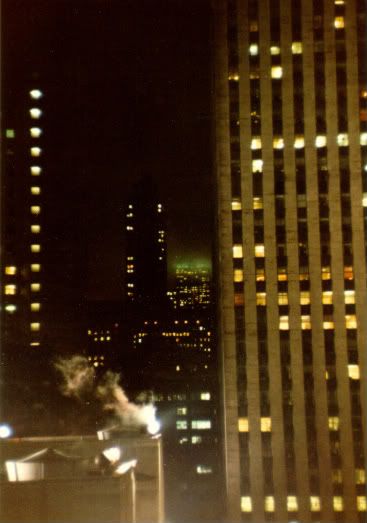Sunday, July 03, 2005
What's Behind the Iranian Election?
Before you fall for FauxNews and the Bush administration's echo chamber starting to beat war drums over Iran, let's take a look at what's ACTUALLY going on in Iran with the election of Mahmoud Ahmadinejad as president.0 comments
NYTimes: For the Poor in Iran, Voting Was About Making Ends Meet
Iran today actually sounds more like America in the Thirties, with its agrarian population pushed into poverty and forced to migrate to the cities in the fruitless search of work.
And just like in every other country in the world's history, politicians who espouse a populist view of economic relief to the swelling masses of poor citizens (in Iran's case, pushing 30% of the country living below the poverty line) wins the day.
It's odd that the poor and the rich are both extremely adept at voting their own economic self-interests. It's the middle. and upper-middle classes that have such a hard time mastering that basic principle.
Mr. Ahmadinejad, who catapulted to president-elect from near obscurity as the appointed mayor of Tehran, campaigned on a populist message, promising to redistribute the nation's wealth, hold down prices, raise salaries and lift state-supported benefits for the poor. He infused those pledges with the theme of social justice, which resonated in a society where aiding the poor is considered an obligation for the faithful.
His message came at the right time. In 1997 and again in 2001, voters focused their political will on social and democratic freedoms in electing Mohammad Khatami to the presidency. But his promised reforms were hardly carried out, and in the election last week voters appeared to have shifted focus to their pocketbooks. One candidate, Mehdi Karroubi, a former speaker of Parliament, just missed making it to the runoff election for president after promising to pay each family the equivalent of $60 a month if elected.
Average salaries run about $200 a month in Iran, with a salary of $300 to $500 considered generous. But costs are fast outstripping the ability to pay—government figures put annual inflation at about 15 percent, though on some products, merchants say prices rise far faster than that.
But since Ahmadinezhad has a decent record of religious fundamentalism, the brilliant lights in the White House are taking some well needed time off from helping their cronies steal from the U.S. Treasury to whip up a frenzy in the corporate media about Ahmadinezhad being Satan, and the next big threat and all that.
I was surprised to see Wikipedia all over this so early.
Platform
Ahmadinejad has generally sent mixed signals about his plans for his presidency, which some U.S.-based analysts consider to have been designed to attract both the religious conservative and the socially and economically poorer people. The following is based on what is not known to have been denied later by him or his supporters. The main slogan for his campaign was "It's possible and we can do it."
In his presidential campaign, Ahmadinejad had taken a populist approach, with emphasis on his own simple life, and had compared himself with Mohammad Ali Rajai, the second President of Iran—a claim that raised objections from Rajai's family. Ahmadinejad plans to create an "exemplary government for the world people" in Iran. He is a self-described principlist; that is, acting politically based on Islamic and revolutionary principles. One of his goals were "putting the petroleum income on people's tables," referring to Iran's oil profits being distributed amongst the poorer classes.
"Uh-oh. Can't have that. Obviously, another one of those "take our profits to feed the poor" clowns. Mr. Secretary, what do we have on this moron?"
Wikipedia should be given credit for pushing this even to the extent of debunking the wild charges of the Swift Boat Hostages that Ahmadinejad was a nasty, hot-headed leader among their captors. Mr. Ahmadinejad may well have been involved; we can safely assume he was, given his resume. But that's akin to slamming a fifty-plus-year-old American for attending anti-Vietnam rallies or shutting down their campus in 1968. It's what most everyone did in that place and tiime. We can also safely assume that an in-depth story on "Where Are They Now," will show that the individuals involved in the hostage taking have moved into various places of high and low estate within Iranian society, including the Iranian government.
In any event, the photos which the echo chamber has been using to extort Americans to demand we "Nuke'em High Now" have a few flaws in them, to say the least. As in, they're wrong.
Wikipedia also gets this classic shot in:
Allegations
Since he has won the presidential elections a number of unsubstantiated allegations have surfaced on the major Western news media about Ahmadinejad. All this seems to be deliberate and calculated to associate Iran with "terrorism" which has been going on for a quite a long time in the Western media about Iran. Initially a photo of an MKO hostage taker was published, claiming it to be Ahmadinejad (it is interesting, by the way, that Washington now supports the MKO). Later claims were made that Ahmadinjead was involved in assassination of Kurdish leaders in Europe. Again, all major Western news agencies were quick to publish this news with big headers, without any evidence or reasonable investigation into the veracity of the claim. It is likely that more such allegations will start to show up in Western news media. It is interesting that nobody in the West starts questioning the integrity and authority of these news agencies despite numerous such false reports.
So, yes, "Heeeey, wait a minute, here..." is the proper response when you hear ANY story in the Corporate Media about Iran.
Now, if the U.S. took a page from President Bill Clinton's playbook and decided to wage covert economic warfare against the new Iranian leadership, and "felt the Iranian people's pain," and flooded the country with new money, people on the brink of starvation would see us as saviors, not as The Devil we normally portray.
posted by Gotham 11:29 AM
0 Comments:

